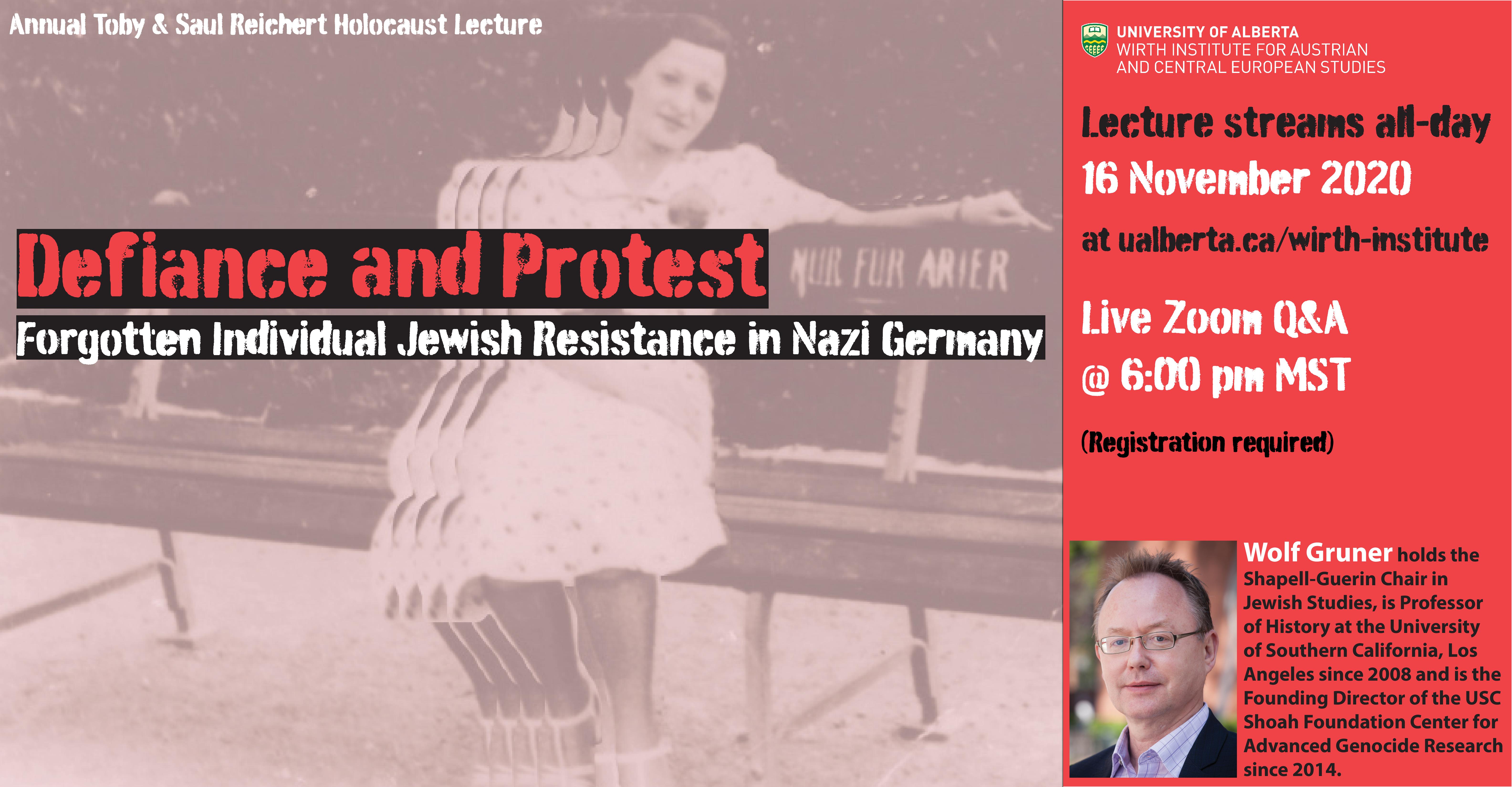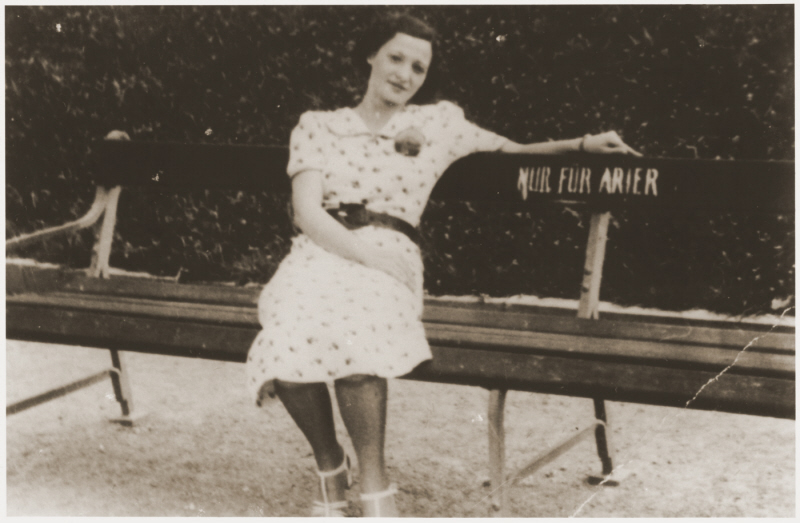2020 Annual Toby & Saul Reichert Holocaust Lecture

"Defiance and Protest: Forgotten Individual Jewish Resistance in Nazi Germany"
Dr. Wolf Gruner, University of Southern California
16 November 2020

Jewish resistance during the Holocaust is largely understood as rare armed group activities in the Nazi occupied East, for example ghetto uprisings or partisan activities. By contrast, this talk focuses on forgotten individual acts of resistance, like the case of Hertha Reis, who protested in plain daylight against the persecution in 1941, a few months before the mass deportation started in the capital of the Third Reich. She exclaimed in front of the Berlin courthouse “We lost everything. Because of the damned government, we finally lost our home, too. This thug Hitler, the damned government, the damned people. Just because we are Jews, we are discriminated against.”
Based on a new approach and using new sources, as logbooks of Berlin police precincts, trial materials from various German cities as well as video testimonies of survivors, the talk will demonstrate how Jewish women and men performed countless acts of resistance in Nazi Germany proper between 1933 and 1945. The examples that this nearly ten year long research unearthed demonstrate that Jews reacted not only to well-known national laws, but also to anti-Jewish restrictions and violence at the local level. Jewish women and men of all ages and from all educational and professional backgrounds defied Nazi measures or raised their voices in protest. They developed changing response strategies over time: first against Nazi propaganda and exclusionary economic measures, later against violent local attacks and municipal restrictions as well as the nationwide November pogrom and radical segregationist laws, and finally against forced labor and deportation.
The fact that German Jews protested in public and that so many defied Nazi measures obliterates the common view of passivity on the part of the persecuted. Thus, this research gives agency back to ordinary Jews in extraordinary circumstances. Many German Jews evolve as historical actors who resisted oppression. However, their courageous acts still wait to be incorporated into the general narrative of the persecution of the Jews in Nazi Germany.
About the Toby & Saul Reichert Holocaust Lecture Series:
This campus and community-wide public lecture is made possible by the support of the broader Edmonton community, as well as Mr. Saul and Mrs. Toby Reichert.
Saul Reichert was born in Pabianice, Poland. He was nine years old at the outbreak of World War II. Following the German occupation of their hometown, Saul’s family home, business, and possessions were plundered, and they were forced to resettle in the Lodz Ghetto. From there, they were eventually shipped to the notorious Auschwitz-Birkenau death camp. Upon arriving here, Saul was separated from his mother and sister, and never saw them again. Saul managed to survive, and was liberated by US troops in May, 1945.
The Reicherts regard the Wirth Institute’s lecture series as a way of keeping knowledge and understanding of the Holocaust alive among future generations of students, not only serving the purpose of commemorating the tragedy, but as a cautionary epistle against such monumental injustices perpetrated on the innocent.
About our speaker:
Wolf Gruner holds the Shapell-Guerin Chair in Jewish Studies, is Professor of History at the University of Southern California, Los Angeles since 2008 and is the Founding Director of the USC Shoah Foundation Center for Advanced Genocide Research since 2014.
He is a specialist in the history of the Holocaust and in comparative genocide studies. He received his PhD in History in 1994 as well as his Habilitation in 2006 from the Technical University Berlin. He was a postdoctoral fellow at Harvard University, Yad Vashem Jerusalem, the US Holocaust Memorial Museum, Women’s Christian University Tokyo, and the Center for Jewish Studies Berlin-Brandenburg, as well as the Desmond E. Lee Visiting Professor for Global Awareness at Webster University in St. Louis.
He is the author of ten books on the Holocaust, among them “Jewish Forced Labor under the Nazis. Economic Needs and Nazi Racial Aims”, with Cambridge University Press (paperback 2008). He also published „Parias de la Patria“. El mito de la liberación de los indígenas en la República de Bolivia 1825-1890”, in Spanish with Plural Editores 2015. Gruner’s most recent book is The Holocaust in Bohemia and Moravia. Czech Initiatives, German Policies, Jewish Responses (Berghahn 2019) The original German version with Wallstein 2016 received the award for most outstanding German studies in humanities and social sciences in 2017, the Sybil Halpern Milton Memorial Book Prize of the German Studies Association 2017 for the best book in Holocaust Studies in 2015-2016 and was a finalist for the Yad Vashem International Book prize for Holocaust Research 2017. The book was published in Czech 2019 and is forthcoming in Hebrew 2020.
He coedited four books, including „Resisting Persecution. Jews and Their Petitions during the Holocaust” (Berghahn 2020), “ New Perspectives on Kristallnacht: After 80 Years, the Nazi Pogrom in Global Comparison” (Purdue UP 2019), and“The Greater German Reich and the Jews. Nazi Persecution Policies in the Annexed Territories 1935-1945” (Berghahn 2015).
He is currently finishing the manuscript of an exciting book about forgotten acts of individual defiance, protest and resistance of German and Austrian Jews during the Holocaust. This book for a broader public will feature the life stories of five Jewish men and women who defied or protested against persecution in Nazi Germany. By exploring additional courageou acts, the book will demonstrate the wide range of individual resistance.
He is an appointed member of the Academic Committee of the US Holocaust Memorial Museum (since 2017), the executive committee of the Consortium of Higher Education Centers of Holocaust, Genocide and Human Rights Studies (since 2018), the International Academic Advisory board of the Center for the Research on the Holocaust in Germany at Yad Vashem’s International Institute for Holocaust Research, Jerusalem (since 2012), and the International Advisory Board of the Journal of Genocide Research (since 2010).
To view a full list of previous Reichert Holocaust Lecture speakers, click here.